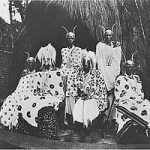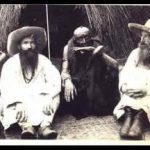The Process Of Infeudation
The Tutsi seem to commend themselves to the chieftains as a matter of course, or else he can force them to it. There is one instance of a Tutsi on Remera who seems to have refused to pay allegiance to the chieftain, Rwamabyogo, before he was deposed. Rwamabyogo plagued this man by, in the latter’s words, “treating me like a Hutu“, and by pressing his droit du seigneur often and consistently upon the Tutsi’s wife. The man finally divorced his wife and left for another Hill. However, as things seemed to have been even worse there, he had to return to Remera. He had to give a cow to Rwamabyogo — to make peace — and then he infeudated himself to the chieftain. However, this was not a usual case in that most Tutsi would have accepted the situation, whether they liked it or not, because it meant their being more secure with a strong protector.
If his patron is politically powerful, the client is certain of being always “right” in disputes. If one is “powerful, one is right”; if one is weak, one is “wrong“. There is no morality involved. The English language has no words available to express these ideas. The closest we can come to it is: might is “right”, which, morally speaking, is flot true. The moral concepts of “right” and “wrong” as understood in our culture were introduced by the missionaries, although there have always been values concerned with appropriate and inappropriate behavior in terms of cultural norms.
In theory, the Hutu cannot be chased away from their land, and are under no obligation to commend themselves to anyone. In fact, however, they have to commend themselves, and their hold on their property is precarious. In theory, the heads of households within the igikingi do not have to be clients of the Tutsi in whose igikingi they reside, but, in practice, the peasant can be harassed by the politically stronger Tutsi into service and “gifts”. The peasant is thus infeudated (guhakwa) unless he has a stronger protector in, for example, the chieftain. But even that does not necessarily extend the desired protection because the chieftain can also grant the corvée labor (uburetwa), and dues in produce (ibihunikwa), which are due him as chieftain — not as patron — from all inhabitants, as privileges to a Tutsi fief-holder. In such a case, the peasant becomes, in effect, the client (umugaragu), of the Tutsi in whose igikingi he is located.
The most obvious protector, however, is the chieftain, to whom the peasants usually commend themselves. If a man has a son, he sends him to the chieftain in his stead. (If he has several sons, he may, theoretically, send one out into the surrounding countryside in search of an even stronger patron, in the hope that he will protect him and his family against the vicissitudes oflocal patronage. This, however, is practical for and practiced by the Tutsi.) But even if the patron is the local chieftain, the person seeking patronage or delegated to seek patronage has to gufataigihefor as long as two or three years before being sent home with the assurance of protection: a cow. But service does not end there. Calabashes of beer and dues in goods and work are still obligatory and have to be kept up if the patron is not to signify withdrawal (kunyaga) of his protection by demanding the return of the cow.
https://uk.amateka.net/the-process-of-infeudation/https://uk.amateka.net/wp-content/uploads/2021/06/ibiranga.jpghttps://uk.amateka.net/wp-content/uploads/2021/06/ibiranga-150x150.jpgModel CitizenshipThe Tutsi seem to commend themselves to the chieftains as a matter of course, or else he can force them to it. There is one instance of a Tutsi on Remera who seems to have refused to pay allegiance to the chieftain, Rwamabyogo, before he was deposed. Rwamabyogo plagued...BarataBarata rpierre@ikaze.netAdministratorAMATEKA | HISTORY OF RWANDA




